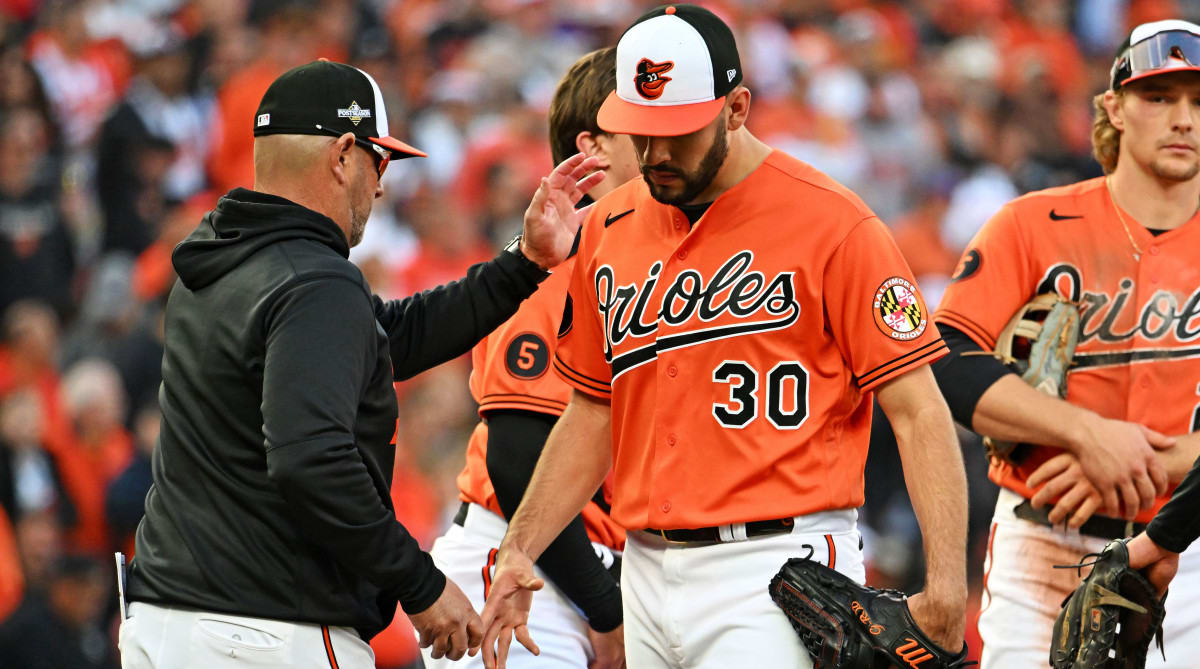There is no joy in planning for a nightmare. But it’s a requirement for a big-league manager in October.
The Orioles’ situation got awfully nightmarish in a hurry against the Rangers in Game 2 of the ALDS. Rookie starter Grayson Rodriguez was chased out of the game in the second inning, falling behind in the count early and often, allowing plenty of contact on his fastball. And Baltimore skipper Brandon Hyde did not seem to have much of a plan for that.
The Orioles built a two-run lead in the first inning. Yet by the time Rodriguez was pulled in the second, they were down by three, and the bullpen had them losing by seven runs in the third. Their attempts at a comeback were not enough: Baltimore ultimately lost to Texas by a score of 11–8. The Orioles were the best team in the American League this year and won more than 100 games for the first time in decades. But their season is now on the brink as they go on the road down 0–2 in a best-of-five ALDS.
“Our backs are against the wall right now,” Hyde said. “Tonight wasn’t our best night on the mound. Give them a lot of credit for being down… then giving ourselves a chance, getting some baserunners, scratching away a little bit. We have to go to Texas and play well.”

Tommy Gilligan/USA Today Sports
Rodriguez allowed five runs in the second on a slow drip of disaster: walk, single, double, groundout, walk, single, single, force out, single until he was finally relieved. (And this came after the rookie had escaped a bases-loaded jam in the first.) The plan had been to attack the Rangers with heat rather than give them too many opportunities with off-speed stuff, Rodriguez says. “But I was just spraying a lot of fastballs out of the zone, falling behind in the counts,” he says. “I think that was the reason for the struggle.” It was his shortest start of the year.
Yet it was what followed that felt most damning for the Orioles.
They were down three runs at this point—frustrating, certainly, but not insurmountable. They had seven innings to mount a comeback against a Texas bullpen that has been shaky, and Rangers starter Jordan Montgomery had needed 55 pitches to get through just two frames, meaning they’d likely see that ‘pen sooner rather than later. It was, in other words, a situation that still allowed a path to a potential win. No team wants to see its starter get shelled in the playoffs. But it happens, and when it does, there must be a plan to counter it.
That can be going to a long reliever designed to eat innings. (On Baltimore’s roster, that would be Jack Flaherty, who has years of experience as a starter and, though he’s struggled this year, seemed to be on this playoff roster for this express purpose.) Or, given the stakes in a short postseason series, it could be something more drastic, like turning to the starter for a potential Game 4.
The Orioles instead went to some of their standard middle relievers.
Hyde turned to Danny Coulombe to face one batter and record the final out of the second. To start the third, he went with Bryan Baker, who spent most of the second half in Triple A, including the final two weeks of the season. He walked the bases loaded. Hyde then pulled him for Jacob Webb. He promptly allowed a grand slam.
GRAND SLAM MITCH GARVER 💥
— FOX Sports: MLB (@MLBONFOX) October 8, 2023
RANGERS LEAD 9-2!!
📺: FS1 pic.twitter.com/CxMiAJGTXy
The Orioles still ended up going to Flaherty later. He allowed one run on two hits in two innings of work, and Baltimore then turned to its standard late-inning relief corps, getting a frame apiece from Tyler Wells, Cionel Pérez and Yennier Canó. This represented almost the entirety of the usable ‘pen.
“I pretty much used everybody available,” Hyde said. “Hopefully we get to regroup the next day off and work out tomorrow and be ready to go in a couple of days.”
This loss does not fall entirely on that choice from Hyde—far from it. There’s blame for the Orioles pitching staff, of course, and credit to the Rangers’ offense. Texas boasted one of the AL’s best lineups in the regular season with a 113 OPS+ and tied for the league lead in home runs. This is a powerful, patient team capable of doing damage against essentially anyone. And it doesn’t help that the Orioles had limited options to counter that. The main critique of their deadline approach was that the front office failed to adequately bolster the pitching staff and, well, that was obvious here. Beyond that, good process can lead to bad results all the time, and vice versa. But it’s still hard not to wonder how this might have gone with a greater sense of urgency in the managerial choices here.
The Orioles’ offense did what it could here. They were able to chase Montgomery out of the game fairly early and then work on the Texas bullpen. But their eight runs on 14 hits were not enough.
“There was still a lot of game left,” said Baltimore outfielder Aaron Hicks, who hit a three-run home run in the ninth. “We [had] to just keep getting runs across any way we can, and that’s what we were doing, we were just inching closer and closer, and we weren’t able to get it done.”
The Orioles have not been swept in a series all year. They will try to keep that streak intact—and their season alive—in Game 3 on Tuesday.







